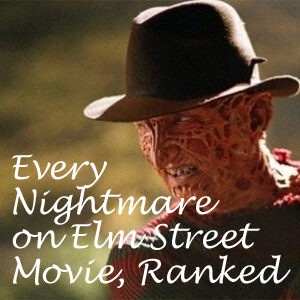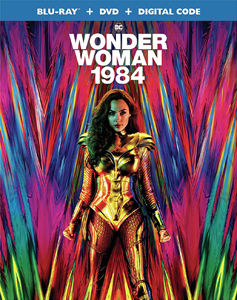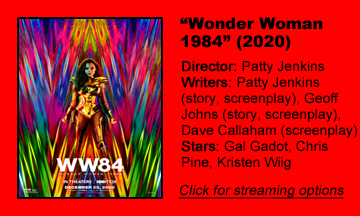“Wonder Woman 1984” has automatic goodwill by being released straight into our homes for free (if we already have HBO Max), and director/co-writer Patty Jenkins cashes in a lot of it in the early going. We like Diana/Wonder Woman because she’s so perfectly played by Gal Gadot, and Chris Pine’s Steve Trevor has great chemistry with our heroine, and Kristen Wiig makes a decent Barbara/Cheetah.
But after a neat Themyscira triathlon in the style of ancient Rome featuring kiddie Diana (Lilly Aspell, returning from the 2017 original), the sequel moves to 1984 Washington, D.C., and switches to a plodding pace.
Diana expands skill set
The highlights are everything that expands Diana’s character in what feels like episode two of a TV series: It has a few more origin-story elements within a standalone story about the villain-of-the-week. Wonder Woman learns how to fly, harnesses magic (?) to make things invisible if she thinks hard, and becomes a pro at using her golden lasso as a swinging rope.
Diana’s innocence, which shines through on Gadot’s face, is emphasized when Steve returns by magic. Diana has been brooding over the death of her true love for six decades, having fended off what we can assume to be thousands of men’s advances.
“WW84” skims over the oddity of Wonder Woman having done nothing superheroic for the better part of the century (at least not that mainstream society noticed), asking us to sit back and enjoy a mall-based fight scene against small-time crooks and not think too hard about it.
I did think about it after the movie, though, and my conclusion is that just as Wonder Woman ages slowly (I estimate her to be about 5 centuries old), she experiences time differently. From her perspective, it’s not extreme to wallow for decades.
A melancholy reunion
There’s a not-unappealing melancholy to the reunion of Diana and Steve that calls to mind the “Angel” episode “I Will Remember You.” Long before the plot reaches its end point, the couple knows on some level this can’t last.
Although severely underplayed, it’s also notable that Steve takes over the body of a D.C. resident played by Kristoffer Polaha, so engaging in their magic happiness is an immoral act by Diana and Steve no matter how you parse it.
“WW84” is largely the story of villain Maxwell Lord (a game Pedro Pascal). The corner-cutting corporatist (imagine Trump in his less evil younger years) acquires wish-granting powers, which he increases exponentially via a worldwide broadcast.
Like most superhero movies, things get bombastic in the final act, but to its credit, “WW84” keeps its focus on the people. With each granted wish, Lord gets something back from the person, so pretty soon he’s a supervillain – yet he’s still a flawed, normal dude at heart, haunted by not being a good father.
This is “The Monkey’s Paw” told on its largest-ever scale; the film admits this foundation when Steve references W. W. Jacobs’ 1902 short story.

The street-level villain is Barbara/Cheetah, who is well-played by Wiig but unfortunately overshadowed. Small chuckles are gleaned from the wallflower scientist suddenly (after her wish) gaining the attention of her Smithsonian colleagues who ignored her.
In Cheetah’s arc, like the others, the tone is vaguely fatalistic. It’s strange that the writers pass on laughs that might be obvious, but certainly would’ve been a blast given Wiig’s comedic chops.
Colorful action
The action sequences pop, starting when the red-and-blue-outfitted Wonder Woman swings her yellow lasso in a mall that’s such an orgy of Eighties hair-and-fashion nostalgia that the thieves are almost beside the point. (This raises another question: Does Wonder Woman care about being found out by the public?)
The Eighties-ness isn’t maintained, except for the nuclear-war scenario in the background. (It should be noted that although this story takes place in the past, the stakes feel as legitimate as a present-day comic-book yarn.)
Later, an epic desert-road fight ranks with anything Gadot experienced in her “Fast & Furious” days, and a White House foyer makes a fine place for another showdown.
The action figures and playsets are in place, and the execution is professional. But “WW84” chooses to focus on increasingly unhinged tragic villain Maxwell Lord and an overwrought message about … well, that’s up for debate. Suppressing your dreams for the sake of the greater good? That doesn’t seem quite right. The value of unselfishness? That sounds better.
And there’s one last logistical question: What if someone wishes for world peace? Shouldn’t that cancel out the people wishing for power?
In the end, “Wonder Woman 1984’s” screenplay aims for the wrong things, and misses the mark anyway. But when it’s just Diana and Steve on screen, or star-spangled Wonder Woman fighting baddies or flying through the clouds, the magic writes itself.


